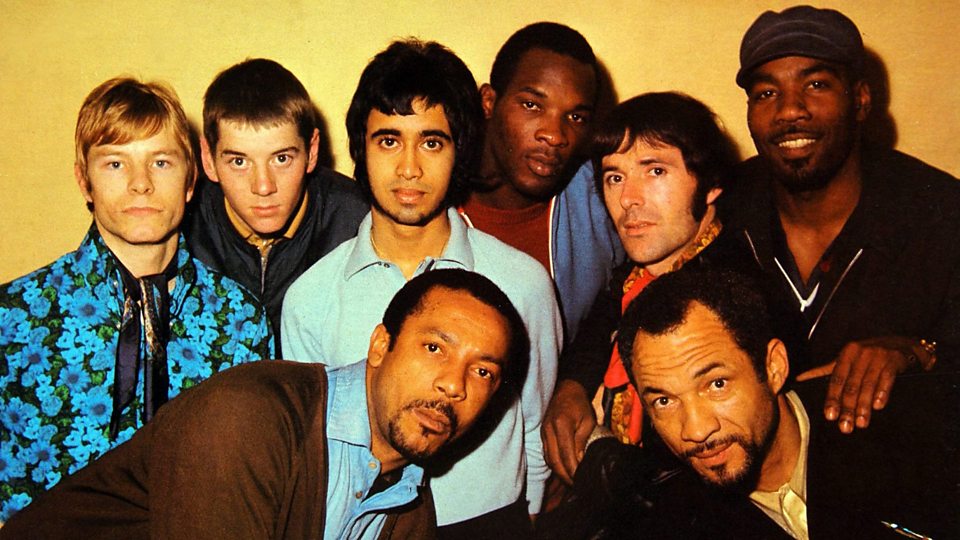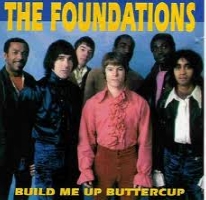The Foundations

The Foundations were originally a Ska/Reggae/ band called ''The Ramongs'' fronted by two lead singers, Ramong Morrison and Clem Curtis.The group was a multi-racial mix of West Indians, White British, and Sri Lankan, they came together in Bayswater, London, in January 1967. They
practised and played in a basement club & former gambling den called ''The Butterfly Club'', which they ran. While managing the club themselves, they played music nightly, They would get to bed around 6 or 7 a.m., sleep until 4 p.m., get up and begin again to get ready to open
at 8 p.m. Sometimes they barely made enough money to pay the rent, let alone feed themselves. At times, they lived off the leftovers and a couple of pounds of rice. When Morrison left the band to occupy a room for six months at Her Majesty''s pleasure, Joan, a friend of the band,
suggested a replacement singer called ''Arthur Brown'', (later to find worldwide fame as The god of hellfire with ''The crazy world of Arthur Brown''), it was at this stage hthat they decided to diversify their repertoire to include Soul and Tamla and also choose a new name,
Guitarist Alan Warner came up with The Foundations. Arthur stayed with the band for about six weeks gigging in and around London before leaving to do his own thing. We decided to carry on with just the one singer after that.
Just as things were starting to take off with lots of punters coming in to listen to the music, eat, drink and chat the protection racket moved in, some of the Band members came back after a day out to find that Lead singer Clem was tied up with a knife to his throat, we had no choice but
to move out with all our belongings to the derelict Mini Cab office above, It was here that the band was discovered by Ron Fairway a partner of Millionare property tycoon Barry Class who as it turned out owned the entire building, Fairway was assigned by Class to look out for musical
talent to expand into the Pop business, after hearing the band Class thought we had something different and decided to sign us up, he paid us a retainer so we could carry on working on our music style. After a few gigs in and around the London area including the Carib Club
and the Q club the Roy Tempest Agency landed them a couple of tours backing ''The Toys'', (''Lover''s concerto''). Then American Soul Legend ''Edwin Starr'', (''S.O.S,'' ''OO soul'', ''and ''War what is it good for''), these shows really did give the band a lot of experience
especially when touring with the very disciplined professional Edwin Starr.
Ron Fairway then managed to persuade A&R man Tony Macauley to come and check them out, a rehearsal room at the Prince of Wales pub in London was booked and Macauley sat and listened, he was,nt too sure what to make of them at first as he was still suffering from a huge hangover the night before, either way he decided to give them the benefit of the doubt and booked them into a studio at Pye recording company, he had a song called Baby, now that Iv,e found you which he co-wrote with Pye's musical director John McCloud.
The session proceeded with the band playing a couple of songs from their live set as a warm up then they recorded Baby, now that Iv,e found you onto two 4 track machines running in sync to provide 8 tracks, the whole thing was recorded in a couple of hours.
When "Baby Now That I've Found You" was first released it went nowhere. Luckily the BBC's newly founded BBC Radio 1 were looking to avoid any records being played by the pirate radio stations and they looked back at some recent releases that the pirate stations had missed. "Baby, Now
That I've Found You" was one of them. The single then took off and by November was number one in the UK Singles Chart.[2] This was the ideal time because of the soul boom that was happening in England since 1965 and with American R&B stars visiting the UK, interest and intrigue in
the Foundations was generated. Their second single released in January 1968, "Back on My Feet Again", did not do as well but made it to No. 18 in the UK,[2] and No. 29 in Canada. Also in January 1968 they were invited to put down some tracks for John Peel's radio show. on the same
day, PP Arnold was in the studio with Dusty Springfield and Madeline Bell as her backing vocalists.
The Foundations drew much interest and intrigue due to the size and structure of the group. Not only was there a diverse ethnic mix in the group, but there was also diversity in ages and musical backgrounds. The oldest member of the group was Mike Elliott, who was 38 years old. The
youngest was Tim Harris, who, at 18, was barely out of school. The West Indian horn section consisted of Jamaican-born Mike Elliott and Pat Burke, both saxophonists and Dominican-born Eric Allandale on trombone. They were all highly experienced musicians who came from professional
jazz and rock-and-roll backgrounds. Mike Elliott had played in various jazz and rock and roll bands including Tubby Hayes and Ronnie Scott, the Cabin Boys (led by Tommy Steele's brother, Colin Hicks), and others. Pat Burke, a professional musician, was from the London Music
Conservatorium. Eric Allandale had led his own band at one stage as well as having played with Edmundo Ros and was a former member of the Terry Lightfoot and Alex Welsh bands. Alan Warner was the guitarist who already turned fully professional a few years before and had performed
numerous gigs with an array of different groups. Bassist Peter Macbeth was a former teacher. Tony Gomez, the keyboard player, was a former clerk, while Clem Curtis had been an interior decorator and professional boxer.
To be continued.....
They carried on running the club, until they were eventually forced out by a protection racket gang. They moved into a squalid disused Mini-cab office next door, where they were discovered by Ron Fairway who introduced them to businessman Barry Class.

Get In Touch
Alan Warner
Edgware
Middlesex
Telephone: Mobile: 07876611781
Email: alan_warner@btinternet.com

